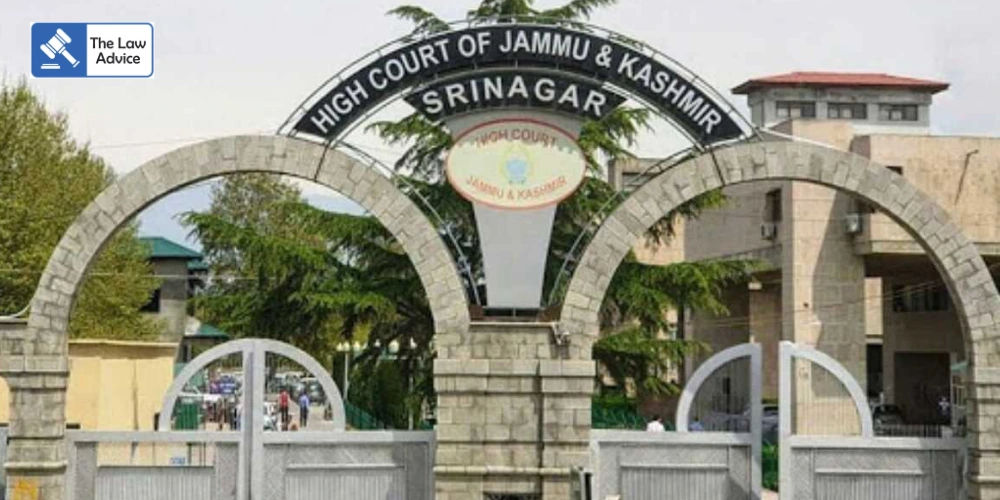
The Jammu & Kashmir and Ladakh High Court on October 13 declined to grant interim relief in a batch of petitions challenging the forfeiture of 25 books under Section 98 of the Bharatiya Nyaya Sanhita (BNS) for allegedly propagating secessionist narratives.
A three-judge special bench comprising Chief Justice Arun Palli, Justice Rajnesh Oswal, and Justice Shahzad Azeem issued notice on the individual petitions, but refused to issue notice on a PIL, observing that the matter was not in public interest as “90% of people would not understand the issue.”
The petitions were filed to contest the August 5 notification issued by the Home Department of the Union Territory of Jammu & Kashmir, which had declared the listed 25 books as “forfeited” under Section 98 BNSS, alleging that they propagated false narratives, glorified terrorism, vilified security forces, and encouraged secessionism.
The impugned notification, published in the Official Gazette, invoked Section 98 BNSS, which empowers the government to declare publications forfeited and issue search warrants if such works are deemed prejudicial to the sovereignty or integrity of India.
The petitioners — Air Vice Marshal (Retd.) Kapil Kak, Dr. Sumantra Bose, Dr. Radha Kumar, and former CIC Wajahat Habibullah — represented by Advocates Vrinda Grover, Adil Pandit, Soutik Banerjee, Devika Tulsiani, and Ratna Appnender, have argued that the government’s order is arbitrary, vague, and legally unsustainable.
They contend that the forfeiture notification merely reproduces the statutory language of Section 98 without identifying specific portions or excerpts from the books that allegedly incite secessionism. The petitioners assert that the order fails to demonstrate any factual basis or reasoning, thereby violating principles of natural justice.
The petitioners rely heavily on judicial precedents, including Narayan Das Indurakhya v. State of Madhya Pradesh (1972), where the Supreme Court held that a forfeiture order must disclose the grounds on which the opinion of the government is based. Merely citing statutory provisions, the Court had said, does not satisfy the requirement of a reasoned decision.
They further cited Harnam Das v. State of Uttar Pradesh and Arun Ranjan Choudhury v. State of West Bengal, which establish that “grounds” must relate to the import, effect, or tendency of the publication and must be discernible from the content itself.
According to the petitioners, the impugned order conflates opinion with evidence, as it fails to demonstrate how each book allegedly promotes secessionism. Instead, it offers sweeping conclusions about the “systematic dissemination of false narratives” without any content-based analysis.
The J&K Home Department justified the forfeiture on the basis that the books collectively contribute to youth radicalisation by glorifying terrorism, distorting historical facts, and fostering alienation from the Indian State.
It declared that the publications “excite secessionism and endanger the sovereignty and integrity of India”, thereby attracting Sections 152, 196, and 197 of the Bharatiya Nyaya Sanhita, 2023 (BNS).
The list of proscribed works includes publications by noted scholars and writers such as Sumantra Bose, A.G. Noorani, Arundhati Roy, Seema Kazi, Hafsa Kanjwal, and Victoria Schofield, many of which were published by Oxford University Press, Stanford University Press, and Routledge.
While the High Court declined interim relief, it agreed to examine the legal validity of the forfeiture order. Notices have been issued to the J&K government to respond to the petitions. The PIL, however, was dismissed at the threshold on the ground that the issue did not qualify as one of general public importance.
The Court’s decision signifies that while the challenge remains pending, the forfeiture order continues to operate, prohibiting sale, distribution, or possession of the 25 listed books until further orders.
Case Details
Case Title: Kapil Kak & Ors. (Senior Citizens) v. Government of J&K (Home Department) and connected matters
Case Numbers: CRM(M) 606/2025; CrlM(1497/2025); WP(C) 2333/2025; WP(C) 2455/2025; WP(C) 2456/2025; WP(C)PIL 12/2025
Bench: Chief Justice Arun Palli, Justice Rajnesh Oswal, Justice Shahzad Azeem
Petitioners Represented By: Vrinda Grover, Adil Pandit, Soutik Banerjee, Devika Tulsiani, Ratna Appnender
Website designed, developed and maintained by webexy